unit 11现在进行时
华师大二附中初中英语九年级全册Unit 11经典题(培优)
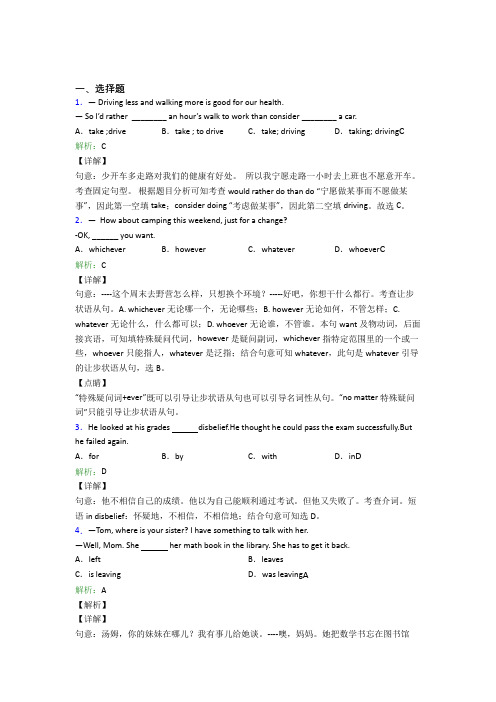
一、选择题1.— Driving less and walking more is good for our health.—So I’d rather ________ an hour’s walk to work than consider ________ a car.A.take ;drive B.take ; to drive C.take; driving D.taking; driving C解析:C【详解】句意:少开车多走路对我们的健康有好处。
所以我宁愿走路一小时去上班也不愿意开车。
考查固定句型。
根据题目分析可知考查would rather do than do “宁愿做某事而不愿做某事”,因此第一空填take;consider doing “考虑做某事”,因此第二空填driving。
故选C。
2.— How about camping this weekend, just for a change?-OK, ______ you want.A.whichever B.however C.whatever D.whoever C解析:C【详解】句意:----这个周末去野营怎么样,只想换个环境?-----好吧,你想干什么都行。
考查让步状语从句。
A. whichever无论哪一个,无论哪些;B. however无论如何,不管怎样;C. whatever无论什么,什么都可以;D. whoever无论谁,不管谁。
本句want及物动词,后面接宾语,可知填特殊疑问代词,however是疑问副词,whichever指特定范围里的一个或一些,whoever只能指人,whatever是泛指;结合句意可知whatever,此句是whatever引导的让步状语从句,选B。
【点睛】“特殊疑问词+ever”既可以引导让步状语从句也可以引导名词性从句。
“no matter 特殊疑问词”只能引导让步状语从句。
3.He looked at his grades disbelief.He thought he could pass the exam successfully.But he failed again.A.for B.by C.with D.in D解析:D【详解】句意:他不相信自己的成绩。
人教版英语七年级下册 Unit 11 Section A (1a-2c)
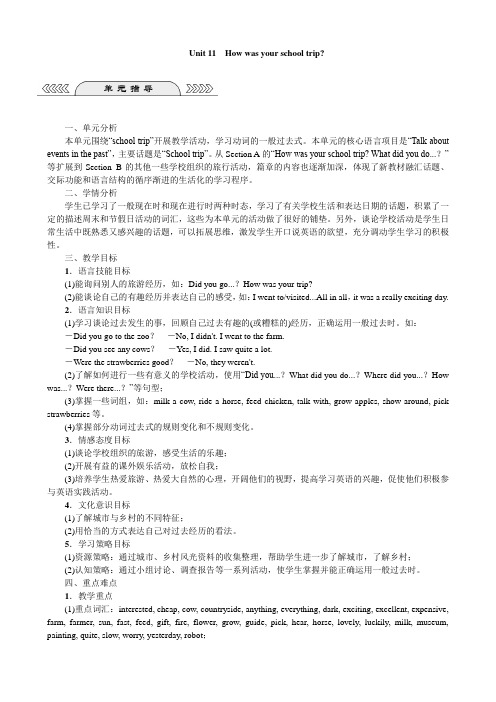
Unit 11How was your school trip?一、单元分析本单元围绕“school trip”开展教学活动,学习动词的一般过去式。
本单元的核心语言项目是“Talk about events in the past”,主要话题是“School trip”。
从Section A的“How was your school trip? What did you do...?”等扩展到Section B的其他一些学校组织的旅行活动,篇章的内容也逐渐加深,体现了新教材融汇话题、交际功能和语言结构的循序渐进的生活化的学习程序。
二、学情分析学生已学习了一般现在时和现在进行时两种时态,学习了有关学校生活和表达日期的话题,积累了一定的描述周末和节假日活动的词汇,这些为本单元的活动做了很好的铺垫。
另外,谈论学校活动是学生日常生活中既熟悉又感兴趣的话题,可以拓展思维,激发学生开口说英语的欲望,充分调动学生学习的积极性。
三、教学目标1.语言技能目标(1)能询问别人的旅游经历,如:Did you go...?How was your trip?(2)能谈论自己的有趣经历并表达自己的感受,如:I went to/visited...All in all,it was a really exciting day.2.语言知识目标(1)学习谈论过去发生的事,回顾自己过去有趣的(或糟糕的)经历,正确运用一般过去时。
如:-Did you go to the zoo?-No, I didn't. I went to the farm.-Did you see any cows?-Yes, I did. I saw quite a lot.-Were the strawberries good?-No, they weren't.(2)了解如何进行一些有意义的学校活动,使用“Did you...?What did you do...?Where did you...?How was...?Were there...?”等句型;(3)掌握一些词组,如:milk a cow, ride a horse, feed chicken, talk with, grow apples, show around, pick strawberries等。
剑桥少儿英语一级上Unit11-Our-family-tree.
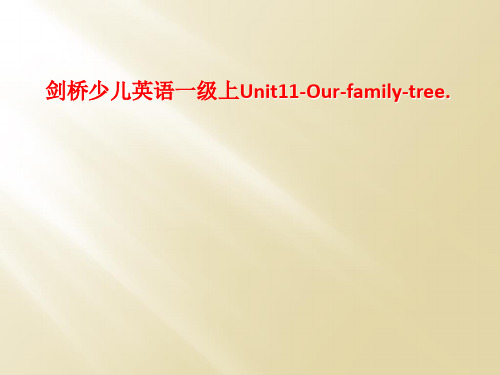
practice
• nuelc • uatn • scuion
uncle aunt
cousin
• pnhewe • niece
nephew niece
• aernpst
parents
• rgrapaensndt
grandparents
Introduction (介绍) This is my dad.
vocabulary (词汇)
He is reading a newspaper. 他正在看报纸
read[ri:d] 阅读
newspaper['njuːzpeɪpə] 报纸
read a newspaper
看报纸
reading a newspaper 正在看报纸
vocabulary (词汇)
watch[wɒtʃ] 观看
3. fun 有趣的 [fʌn]
4. but 但是;而是;然而[bʌt]
5. easy 容易的 ['iːzɪ]
6. busy 繁忙的 ['bɪzɪ]
7. give 给
[gɪv]
8. all 全部的,所有的 [ɔːl] 9. pingpong ball 乒乓球
['pɪŋpɔŋ] [bɔːl] 10. take away 拿走,取走
vocabulary (词汇)
She is holding a doll. 她正在抱一个洋娃娃。
hold [həʊld]
持有;拥有; 握住,抓住;抱住;
doll [dɒl]
洋娃娃,玩偶
hold a doll
抱一个洋娃娃
holding a doll 正在抱一个洋娃娃
广西南宁三中初中英语七年级下册Unit 11测试(答案解析)
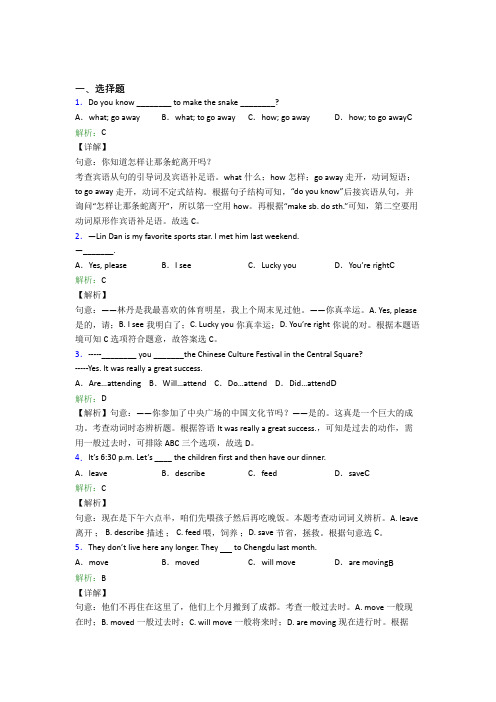
一、选择题1.Do you know ________ to make the snake ________?A.what; go away B.what; to go away C.how; go away D.how; to go away C 解析:C【详解】句意:你知道怎样让那条蛇离开吗?考查宾语从句的引导词及宾语补足语。
what什么;how怎样;go away走开,动词短语;to go away走开,动词不定式结构。
根据句子结构可知,“do you know”后接宾语从句,并询问“怎样让那条蛇离开”,所以第一空用how。
再根据“make sb. do sth.”可知,第二空要用动词原形作宾语补足语。
故选C。
2.—Lin Dan is my favorite sports star. I met him last weekend.—_______.A.Yes, please B.I see C.Lucky you D.You’re right C解析:C【解析】句意:——林丹是我最喜欢的体育明星,我上个周末见过他。
——你真幸运。
A. Yes, please 是的,请;B. I see我明白了;C. Lucky you你真幸运;D. You’re right你说的对。
根据本题语境可知C选项符合题意,故答案选C。
3.-----________ you _______the Chinese Culture Festival in the Central Square?-----Yes. It was really a great success.A.Are…attending B.Will…attend C.Do…attend D.Did…attend D解析:D【解析】句意:——你参加了中央广场的中国文化节吗?——是的。
这真是一个巨大的成功。
考查动词时态辨析题。
根据答语It was really a great success.,可知是过去的动作,需用一般过去时,可排除ABC三个选项,故选D。
新目标版英语七年级下册Unit11Howwasyourschooltrip?(SectionA)含答案
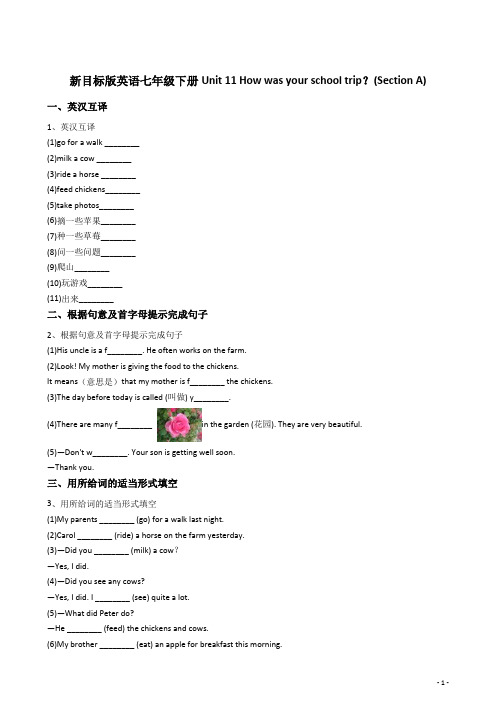
新目标版英语七年级下册Unit 11 How was your school trip?(Section A)一、英汉互译1、英汉互译(1)go for a walk ________(2)milk a cow ________(3)ride a horse ________(4)feed chickens________(5)take photos________(6)摘一些苹果________(7)种一些草莓________(8)问一些问题________(9)爬山________(10)玩游戏________(11)出来________二、根据句意及首字母提示完成句子2、根据句意及首字母提示完成句子(1)His uncle is a f________. He often works on the farm.(2)Look! My mother is giving the food to the chickens.It means(意思是)that my mother is f________ the chickens.(3)The day before today is called (叫做) y________.(4)There are many f________ in the garden (花园). They are very beautiful.(5)—Don't w________. Your son is getting well soon.—Thank you.三、用所给词的适当形式填空3、用所给词的适当形式填空(1)My parents ________ (go) for a walk last night.(2)Carol ________ (ride) a horse on the farm yesterday.(3)—Did you ________ (milk) a cow?—Yes, I did.(4)—Did you see any cows?—Yes, I did. I ________ (see) quite a lot.(5)—What did Peter do?—He ________ (feed) the chickens and cows.(6)My brother ________ (eat) an apple for breakfast this morning.(7)John ________ (study) English last Friday.(8)There ________ (be) two books on the table five minutes ago (以前).(9)They ________ (play) basketball yesterday afternoon.(10)The man ________ (stop) his car and ________ (buy) some strawberries yesterday morning.四、单选题4、It ___________ sunny yesterday. It ___________ rainy today.A、is; isB、is, wasC、was, isD、was; was5、—Jack, is there ___________ in today's newspaper?—No, nothing.A、anything importantB、something importantC、important anythingD、important something6、Yesterday my father ___________ his friends ___________ Tian'anmen Square (天安门广场).A、shows; aboutB、shows, aroundC、showed; aboutD、showed; around7、Could you say it again? I can't understand ___________ you are talking about.A、howB、whenC、whatD、which8、—___________ he go to Central Park?—Yes, he did.A、DidB、DoC、DoesD、Is9、It ___________ last week that the haze(雾霾) in Beijing caused many problems.A、reportsB、reportedC、is reportedD、was reported10、—Did Jim and Sue go to the party?—No, they ___________.A、didB、didn'tC、wereD、weren't11、—Do you need a new dictionary, Susan?—No, Mum. My uncle ___________ me one yesterday.A、buyB、buysC、boughtD、is buying12、—Who is it?—Me. I ___________ this photo when I was four.A、tookB、takesC、takeD、am taking13、Last Sunday, Carol and his friends ___________ some apples and ___________ them home.A、pick; tookB、picked; tookC、picked; takeD、pick, take五、根据汉语提示完成句子14、根据汉语提示完成句子(1)Don't ________(担心). The ________(太阳)is coming out.(2)My classmate helped ________(农民)________(种植)rice and ________(采;摘)apples last Sunday.(3)There are ________ ________ ________ ________ ________(相当多的马)on the farm.(4)—Did you learn ________ ________(优秀的东西)in the ________(农村)?—Yes, I did.(5)She was very ill, but ________(幸运地)she is now out of danger.六、按要求改写句子15、按要求改写句子(1)My school trip was pretty great last weekend.(对画线部分提问)________ was ________ school trip last weekend?(2)The twins played computer games yesterday.(改为一般疑问句,并作否定回答)—________ the twins ________ computer games yesterday?—No, ________ ________.(3)I saw cows last week. (改为一般疑问句,并作肯定回答)—________ you ________ cows last week?—Yes, ________ ________.(4)There were some chickens on the farm.(改为一般疑问句,并作肯定回答)—________ ________ ________ chickens on the farm?—Yes, ________ ________.(5)My family went fishing last Sunday.(对画线部分提问)________ ________ ________ family ________ last Sunday?七、补全对话16、补全对话Jim: Hey, Sally! I didn't see you last Saturday. Where were you?Sally:(1)________Jim: Why?Sally:(2)________Jim: Like what?Sally: Well, I cleaned my room. And I did my homework.Jim:(3)________Sally: Yes. How about you? What did you do?Jim:(4)________Sally: Wow! You had fun.Jim:(5)________八、阅读理解17、阅读理解We went on a school trip to New York. We had a good time. There were twenty-four students and three teachers. It was a five-day trip, and we visited some attractions (景点).We stayed at a hotel and six people had one room. We often had our meals out of the hotel—there were a number of restaurants nearby. We went around the city, and we were really given quite a lot of freedom(自由). So long as (只要) we were back to our rooms by 10 p.m., we could go where we wanted to. I was surprised at how safe I felt walking around New York in small groups. My friends and I enjoyed ourselves on the trip. I would like to advise it to anyone. If you decide to go, you will have a great time!(1)What is the message mainly about?A、A picnicB、A school trip.C、Ice-skatingD、Shopping.(2)How many people went on the trip?A、SixB、TenC、Twenty-fourD、Twenty-seven.(3)According to the passage, which of the following is NOT true?A、Six students lived in one room in the hotel.B、Students had to get back to the hotel by 10 pm.C、Students spent five days on the trip.D、Students had their meals in the hotel.(4)What did the author think of the trip?A、He had a good time.B、He wanted more freedom on the trip.C、He didn't want to come back.D、He was surprised at how dangerous New York was.(5)What does the underlined word "advise" mean in Chinese?A、说B、推荐C、建议D、喜欢答案解析部分一、英汉互译1、【答案】(1)去散步(2)给奶牛挤奶(3)骑马(4)喂鸡(5)照相(6)pick some apples(7)grow some strawberries(8)ask some questions(9)climb the mountains(10)play games(11)come out【解析】【分析】考查短语的英汉互译,注意名词要用复数形式。
河南省七年级英语下册Unit11Howwasyourschooltrip易错知识点总结

河南省七年级英语下册Unit11Howwasyourschooltrip易错知识点总结单选题1、Robert was very upset that most of his friends ________ when he ________ at the party.A.left; had arrivedB.left; arrivedC.had left; arrived答案:C句意:当罗伯特到达晚会时,他的大多数朋友都走了,他很难过。
考查动词辨析和时态。
leave离开;arrive到达。
分析“Robert was very upset that most of his friends...when he...at the party.”可知,当罗伯特到达晚会时,他的大多数朋友都走了。
“到达”这一动作发生在过去,是一般过去时;“朋友已经走了”发生在过去的过去,用过去完成时。
故选C。
2、—________ you born in Cambridge?—No. I ________ born in Canada.A.Was, wereB.Were, wasC.Are, amD.Were, wasn’t答案:B句意:——你出生在剑桥吗?——不,我出生在加拿大。
考查时态及主谓一致。
出生是发生在过去,所以两空都用一般过去时。
结合“No. I...born in Canada.”可知要表示出生在加拿大,第二空是肯定形式;主语you前用be动词Were,主语I后用be动词was。
故选B。
3、He is ________ young ________ go to school.A.so; thatB.too; toC.so; toD.too; that答案:B句意:他太小,不能上学。
考查非谓语动词。
so...that引导结果状语从句;too...to...太……不能……,表否定。
“go to school”动词短语,排除A和D;根据“young”和“go to school”可知此处指“太小,不能上学”,含否定意义,排除C;故选B。
新概念二Unit 11 One Good Turn Deserves Another最全知识点总结
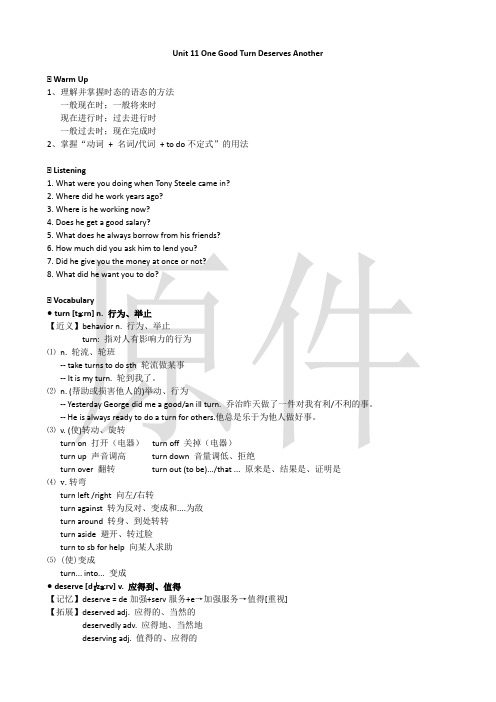
Unit 11 One Good Turn Deserves Another★ Warm Up1、理解并掌握时态的语态的方法一般现在时;一般将来时现在进行时;过去进行时一般过去时;现在完成时2、掌握“动词+ 名词/代词+ to do不定式”的用法★ Listening1. What were you doing when Tony Steele came in?2. Where did he work years ago?3. Where is he working now?4. Does he get a good salary?5. What does he always borrow from his friends?6. How much did you ask him to lend you?7. Did he give you the money at once or not?8. What did he want you to do?★ Vocabulary● turn [tɜ:rn] n. 行为、举止【近义】behavior n. 行为、举止turn: 指对人有影响力的行为⑴n. 轮流、轮班-- take turns to do sth 轮流做某事-- It is my turn. 轮到我了。
⑵n. (帮助或损害他人的)举动、行为-- Yesterday George did me a good/an ill turn. 乔治昨天做了一件对我有利/不利的事。
-- He is always ready to do a turn for others.他总是乐于为他人做好事。
⑶v. (使)转动、旋转turn on 打开(电器)turn off 关掉(电器)turn up 声音调高turn down 音量调低、拒绝turn over 翻转turn out (to be).../that ... 原来是、结果是、证明是⑷ v.转弯turn left /right 向左/右转turn against 转为反对、变成和....为敌turn around 转身、到处转转turn aside 避开、转过脸turn to sb for help 向某人求助⑸ (使)变成turn... into... 变成● deserve [dɪˈzɜ:rv] v. 应得到、值得【记忆】deserve = de加强+serv服务+e→加强服务→值得[重视]【拓展】deserved adj. 应得的、当然的deservedly adv. 应得地、当然地deserving adj. 值得的、应得的【搭配】deserve + n. /pron. 应该得到....、值得.....、应得(奖赏、惩罚等)-- He deserves praise. 他应该得到表扬。
Unit11讲义人教版英语七年级下册
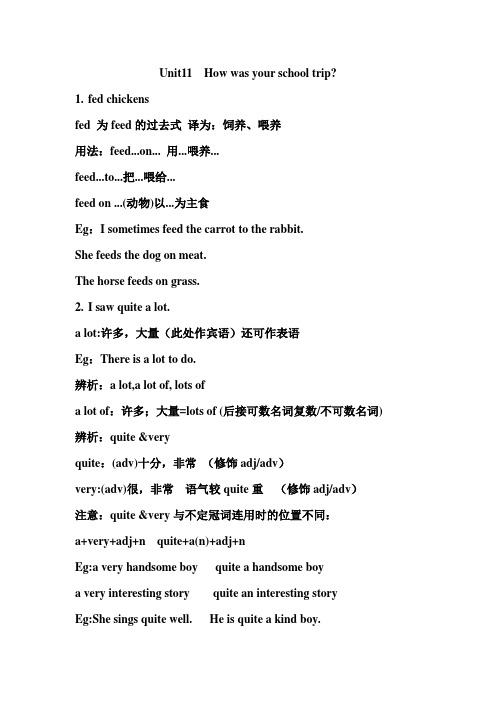
Unit11 How was your school trip?1.fed chickensfed 为feed的过去式译为:饲养、喂养用法:feed...on... 用...喂养...feed...to...把...喂给...feed on ...(动物)以...为主食Eg:I sometimes feed the carrot to the rabbit.She feeds the dog on meat.The horse feeds on grass.2.I saw quite a lot.a lot:许多,大量(此处作宾语)还可作表语Eg:There is a lot to do.辨析:a lot,a lot of, lots ofa lot of:许多;大量=lots of (后接可数名词复数/不可数名词) 辨析:quite &veryquite:(adv)十分,非常(修饰adj/adv)very:(adv)很,非常语气较quite重(修饰adj/adv)注意:quite &very与不定冠词连用时的位置不同:a+very+adj+n quite+a(n)+adj+nEg:a very handsome boy quite a handsome boya very interesting story quite an interesting storyEg:She sings quite well. He is quite a kind boy.This kind of fruit is very healthy. Thank you very much.3.Did you learn anything?辨析:anything&somethinganything:(不定代词)任何事物;某事物(常用于否定句/疑问句中) something:(不定代词)某事(常用于肯定句中) 但是在表示请求、建议、或征求意见的疑问句中常用something注意:(1)adj修饰不定代词,要位于其后(2)不定代词作主语时,谓语动词用单数形式(3)补充其他不定代词some any no every/body thing oneEg:There isn’t anything wrong.There is something wrong with my puter.4.The farmer showed Carol around the farm.farmer:(n)农民farm:(n)农场;(v)干农活farming:(不可数n)农事Eg:The farmers are working on the farm,and there is too much farming.show sb.around...带某人到处参观...Eg:The guide shows us around the museum.与show相关的短语:show sb.sth=show sth.to sb.给...看展示on show 展览show off 炫耀show up出现5.The farmers don’t grow apples.grow:(vt)种植;栽培(vi)生长;发育Eg:Farmers in the south of China mainly grow rice.Everything begins to grow in spring.短语:grow up成长,长大grow into成长为;发展成(由一种情况变成另外一种情况)Eg:I want to be a guide when I grow up.She grows into a lovely girl.辨析:grow&plantgrow: 种植(强调过程/状态)plant:(v)种植(仅表示栽入土中,表示动作)(n)植物Eg:The farmers grow a lot of trees every year.The farmers plant lots of trees every year.There are many different plants in the garden.6....we worried it would rain.worry:(vt)担心;担忧后常接宾语从句Eg:His parents worry that their child will sick.(vt)使担心;使发愁(常接sb.作宾语)Eg:The naughty boy worries his parents.worry about sb./sth.=be worried about sb./sth. 担心某人/某事Eg:Don’t worry about me ./Don’t be worried about me.7.Luckily,it didn’t,and the sun came out again.(1)luckily(adv)幸运地常用于句首,用逗号隔开unluckily不幸地unfortunately fortunate(adj)幸运的fortunately(adv)幸运地以辅音字母+y结尾的形容词变成副词的方法:改y为i再加ly Eg:happy lucky busy angry easy(2)sun moon earth star 都是世界上独一无二的事物,前面必须加the(3)e out出来;发芽;开花;出版与e相关的短语:e from来自 e on加油;快点 e back 回来e down 下来 e in 进来 e up with 提出;想出;赶上e across遇到8.expensive/cheapexpensive/cheap只能形容事物的贵贱;当谈论价格(price)时,只能用high/lowEg:The pen is cheap.=The price of the pen is low.9.All in all,it was an exciting day.all in all:总的来说;总之in a word:简言之in short:总之Eg:All in all, it’s good for you to do more exercise.辨析:all in all, in all,at allall in all:总的来说(常用于句首)eg:All in all, we had a good time. in all:总共;合计(句首/句末)eg:There are fifty students in all.at all:根本常用于“not at all”根本不Eg:He doesn’t like apples at all.与all相关的短语:all the time 一直after all 毕竟10.I didn’t like the trip at all.Not at all 用于回答感谢/道歉Eg:Thank you very much.Not at all.其它的回答:It’s my pleasure. It’s a pleasure. No problem.You’re wele. That’s all right. That’s OK.一般过去时态含义:表示过去某个时间发生的动作或存在的状态,也表示过去经常或反复发生的动作。
河南省七年级英语下册Unit11Howwasyourschooltrip经典知识题库

河南省七年级英语下册Unit11Howwasyourschooltrip经典知识题库单选题1、Dear classmates, may I have your attention, please? I have ________ to tell you.A.important somethingB.important anythingC.something importantD.anything important答案:C句意:亲爱的同学们,请注意,我有重要的事情要告诉你们。
考查不定代词的用法。
important重要的;something某事;anything任何事情。
本题是肯定句,不能用anything,故排除B和D;形容词修饰不定代词时,形容词要后置,故排除A。
故选C。
2、I lost my ticket.But ________,the trip guide gave me another one.A.differentlyB.luckilyC.easilyD.quickly答案:B句意:我的票丢了。
但幸运的是,导游又给了我一张。
考查副词辨析。
A. differently不同地;B. luckily幸运的是,幸运地,幸亏;;C. easily容易地;D. quickly.迅速地,快地。
根据下文“导游又给了我一张”可知“幸运的是”;结合句意可知填luckily;选B。
3、She has ________ hair.A.blue curlyB.short blondeC.straight longD.curly blonde long答案:B句意:她留着金黄色的短发。
考查多个形容词排序。
在英语中,当多个形容词作定语修饰名词时,通常按照限定词+主观看法形容词+特征形容词(大小→长短→形状)形状+老少新旧+颜色+国籍+材料+用途。
A选项颜色排在形状的前面,可排除;B选项中short表示长短,blonde表示颜色,颜色排在长短的后面,B正确;C选项形状排在长短的前面,可排除;D选项形状颜色排在长度的前面,可排除。
《常考题》初中英语七年级下册Unit 11知识点总结(含答案解析)

一、选择题1.---- _______he go to Central Park ? -----Yes, he did.A.Did B.Do C.Does D.Is A解析:A【解析】句意:——他去中央公园了吗?——是的,他去了。
根据he did可知此处用一般过去时,故选A。
2.My brother taught me _______ to make a model plane yesterday.A.what B.how C.where D.why B解析:B【解析】句意:昨天,我哥哥教我怎样制作一个飞机模型。
A. what什么;B. how怎样;C. where哪里;D. why为什么。
本题考查疑问词+不定式的用法,how+不定式做teach的宾语,teach sb.how to do sth.教给某人如何做某事,故答案选B。
3.Mike wasn’t at home _______.A.tomorrow B.now C.yesterday D.next Friday C解析:C【解析】句意:迈克昨天不在家。
A. tomorrow明天;B. now现在;C. yesterday昨天;D. next Friday 下周五。
本题考查一般过去时的时间状语。
由句中的wasn’t可知本题时态应用一般过去时,所以应该用表示过去的时间,结合选项,故答案选C。
4.—Did Molly go to the library yesterday?—_______.A.Yes, she was B.Yes, she is C.Yes, she does D.Yes, she did D解析:D【解析】句意:——莫莉昨天去图书馆了吗?——是的,她去了。
根据问句是did引导的一般过去时的一般疑问句,因此答语也应该用did回答,结合选项,只有D选项符合题意,故答案选D。
5.It’s 6:30 p.m. Let’s ____ the children first and then have our dinner.A.leave B.describe C.feed D.save C解析:C【解析】句意:现在是下午六点半,咱们先喂孩子然后再吃晚饭。
人教新目标英语七年级下册:Unit 11 How was your school trip?一般现在
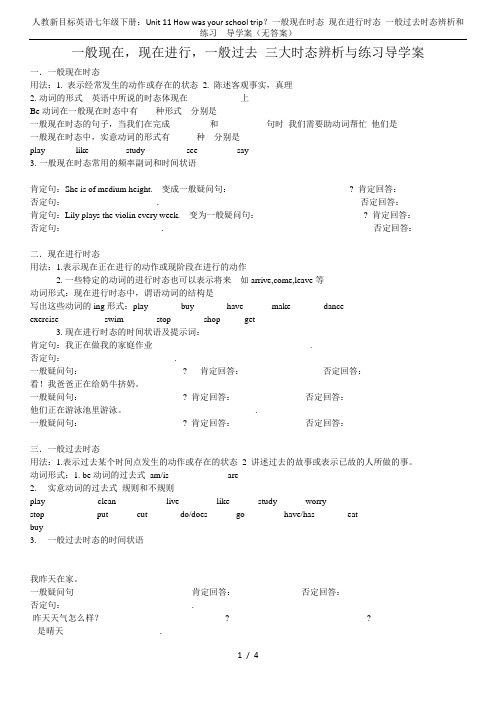
一般现在,现在进行,一般过去三大时态辨析与练习导学案一.一般现在时态用法:1. 表示经常发生的动作或存在的状态2. 陈述客观事实,真理2.动词的形式英语中所说的时态体现在____________上Be动词在一般现在时态中有____种形式分别是_______________一般现在时态的句子,当我们在完成_________和___________句时我们需要助动词帮忙他们是______ _______ 一般现在时态中,实意动词的形式有______种分别是___________play_____ like ______ study _______ see______ say________3.一般现在时态常用的频率副词和时间状语_________________________________________________________________肯定句:She is of medium height. 变成一般疑问句:___________________________? 肯定回答:否定句:_____________________. 否定回答:肯定句:Lily plays the violin every week. 变为一般疑问句:________________________? 肯定回答:否定句:______________________. 否定回答:二.现在进行时态用法:1.表示现在正在进行的动作或现阶段在进行的动作2.一些特定的动词的进行时态也可以表示将来如arrive,come,leave等动词形式:现在进行时态中,谓语动词的结构是__________________写出这些动词的ing形式:play_______ buy_______ have______ make_______ dance_______exercise__________ swim_______ stop_______ shop_____ get_________3.现在进行时态的时间状语及提示词:________________________________________________肯定句:我正在做我的家庭作业____________________________________.否定句:_________________________.一般疑问句:_______________________? 肯定回答:_________________ 否定回答:______________看!我爸爸正在给奶牛挤奶。
中考英语一轮复习教案 九年级全册Unit 11-14
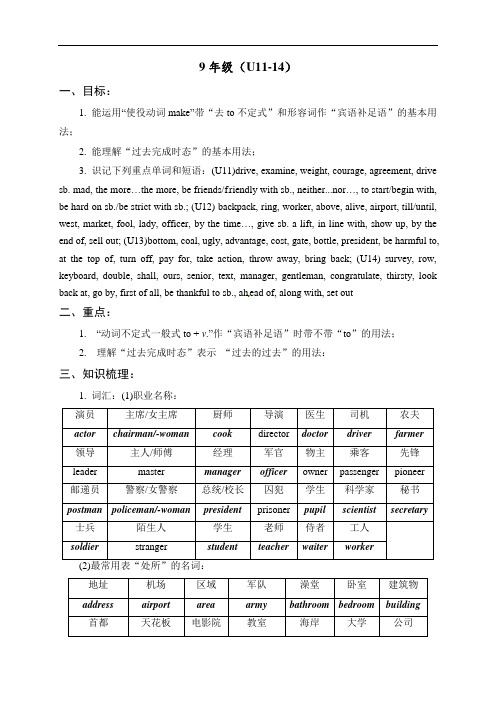
9年级(U11-14)一、目标:1. 能运用“使役动词make”带“去to不定式”和形容词作“宾语补足语”的基本用法;2. 能理解“过去完成时态”的基本用法;3. 识记下列重点单词和短语:(U11)drive, examine, weight, courage, agreement, drive sb. mad, the more…the more, be friends/f riendly with sb., neither...nor…, to start/begin with, be hard on sb./be strict with sb.; (U12) backpack, ring, worker, above, alive, airport, till/until, west, market, fool, lady, officer, by the time…, give sb. a lift, in line with, show up, by the end of, sell out; (U13)bottom, coal, ugly, advantage, cost, gate, bottle, president, be harmful to, at the top of, turn off, pay for, take action, throw away, bring back; (U14) survey, row, keyboard, double, shall, ours, senior, text, manager, gentleman, congratulate, thirsty, look back at, go by, first of all, be thankful to sb., ah ead of, along with, set out二、重点:1. “动词不定式一般式to + v.”作“宾语补足语”时带不带“to”的用法;2. 理解“过去完成时态”表示“过去的过去”的用法:三、知识梳理:1. 词汇:(1)职业名称:演员主席/女主席厨师导演医生司机农夫actor chairman/-woman cook director doctor driver farmer 领导主人/师傅经理军官物主乘客先锋leader master manager officer owner passenger pioneer 邮递员警察/女警察总统/校长囚犯学生科学家秘书postman policeman/-woman president prisoner pupil scientist secretary 士兵陌生人学生老师侍者工人soldier stranger student teacher waiter worker地址机场区域军队澡堂卧室建筑物address airport area army bathroom bedroom building首都天花板电影院教室海岸大学公司2. 句型与语法:(1)使役动词make的两个用法:五、巩固练习:(一)词汇练习(略)1.英汉互译下列单词:(1)职业名称:stranger student(2)最常用表“处所”的名词:卧室address airport area army bathroom building 首都电影院教室ceiling coast college company国家农场concert corner countryside floor gym 医院湖泊陆地图书馆heaven kitchen lab(oratory)会议博物馆办公室公园market nature palace运动场餐馆河流房间学校place pond剧院村庄世界动物园supermarket toilet university(3)表示“感觉、感情”方面的形容词:生气的兴奋的angry crazy excited glad happy interested 紧张的有病mad nice patient surprisedexamine(v.)→_____________(n.) comfortable(adj.) →_____(反义形容词) weight(n.) →_____________(v.) agree(v.) →____________________(v.) expect(v.) →____________(adj.) →_______________(反义形容词)work(n. & v.) →__________(n.) discovery(n.) →_________________(v.) alive(adj.) →________(v.) →______(-ly形式adj.) →______(-ing形式adj.) believable(adj.) →_________(v.) disappear(v.) →____________(反义词) wooden(adj.) →___________(n.) advantage(n.) →____________(反义词) scientific(adj.) →__________(n.) congratulate(v.) →______________(n.)thank(n.) →_____________(adj.) ahead(adv.) →_________________(n.)(二)语法练习1. 语法填空:(1) A: What ______(make) you angry?B: When people throw rubbish on the streets, it makes me ______(anger).C: Me, too. It takes me ______(want) to tell them clean up the streets.(2) I was made ______(cry) by sad movies.(3) _____ the time Mary ____(get) up, Tim had already gone into the bathroom.(4) ____ dinner time, I had already remembered all the news words of the class.(5) A: The river was so dirty. Even the river bottom _____(be) full of rubbish.B: But it ____(use) to be clean!A: Yes, but people _______(throw) litter(垃圾) into the river.B: So I think everyone in the town should _____(help) (to) clean up the river.(6) I ____(be) about to go to school ____ I found that I had left my homework in my bedroom.(7) As I ___________ (talk) with my classmates, I saw our math coming into the classroom.2. 将下列句子译成汉语:(1) When he put the noodles into a bowl, he realized that he had forgotten to add the green beans. __________________________________________________(2) Before she got a chance to say goodbye, he had got into the building.________________________________________________________3. 用英语回答下列问题:(1) What do you remember about Grade 7?________________________________________________________(2) What happened in Grade 8 that was special?________________________________________________________(3) What did you use to do that you don’t do now?________________________________________________________(4) How have you changed since you started junior high school?________________________________________________________(5) How do you think things will be different in senior high school?________________________________________________________(6) What are your plans for next year?________________________________________________________(7) What are you looking forward to?________________________________________________________(三)综合练习1. 听下面的独白,从每小题中所给的A、B、C三个选项中选出符合对话内容的最佳选项。
河南省七年级英语下册Unit11Howwasyourschooltrip知识集锦
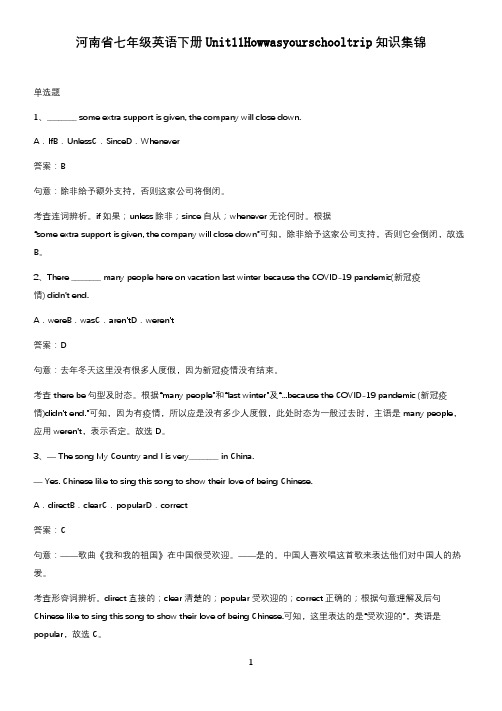
河南省七年级英语下册Unit11Howwasyourschooltrip知识集锦单选题1、________ some extra support is given, the company will close down. A.IfB.UnlessC.SinceD.Whenever答案:B句意:除非给予额外支持,否则这家公司将倒闭。
考查连词辨析。
if如果;unless除非;since自从;whenever无论何时。
根据“some extra support is given, the company will close down”可知,除非给予这家公司支持,否则它会倒闭,故选B。
2、There ________ many people here on vacation last winter because the COVID-19 pandemic(新冠疫情) didn’t end.A.wereB.wasC.aren’tD.weren’t答案:D句意:去年冬天这里没有很多人度假,因为新冠疫情没有结束。
考查there be句型及时态。
根据“many people”和“last winter”及“...because the COVID-19 pandemic (新冠疫情)didn’t end.”可知,因为有疫情,所以应是没有多少人度假,此处时态为一般过去时,主语是many people,应用weren’t,表示否定。
故选D。
3、— The song My Country and I is very________ in China.— Yes. Chinese like to sing this song to show their love of being Chinese. A.directB.clearC.popularD.correct答案:C句意:——歌曲《我和我的祖国》在中国很受欢迎。
(必考题)初中英语九年级全册Unit 11知识点总结

一、选择题1.The good news made all of us ________.A.happy B.to be happy C.happily D.happiest A解析:A【解析】句意:这个好消息使我们大家都很高兴。
A. happy高兴的,形容词;C. happily高兴地,副词;D. happiest最高兴的,最高级。
make+宾语+形容词(作宾语补足语),使/让某人做某事,故答案选A。
2.He looked at his grades disbelief.He thought he could pass the exam successfully.But he failed again.A.for B.by C.with D.in D解析:D【详解】句意:他不相信自己的成绩。
他以为自己能顺利通过考试。
但他又失败了。
考查介词。
短语in disbelief:怀疑地,不相信,不相信地;结合句意可知选D。
3.—Tom, where is your sister? I have something to talk with her.—Well, Mom. She her math book in the library. She has to get it back.A.left B.leavesC.is leaving D.was leaving A解析:A【解析】【详解】句意:汤姆,你的妹妹在哪儿?我有事儿给她谈。
----噢,妈妈。
她把数学书忘在图书馆了。
她不得不去取回来。
本题考查动词时态。
A. left一般过去时;B. leaves一般现在时;C. is leaving现在进行时;D. was leaving过去进行时。
根据“她不得不去取回来。
”可知把数学书忘在图书馆是过去发生的事,故应用一般过去时,故答案为A。
4.You should know it's bad for your health to go to work ____ breakfast.A.for B.to C.on D.without D解析:D【解析】【详解】句意:你应该知道不吃早饭就去上班对你的健康有害。
人教版 初中 英语目录
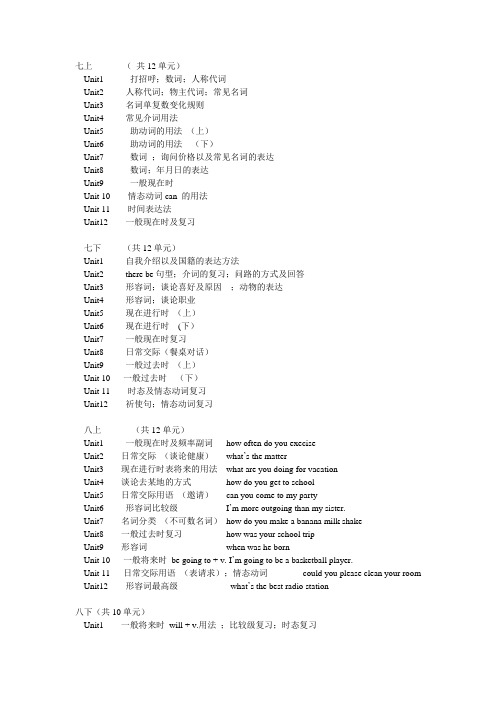
七上(共12单元)Unit1 打招呼;数词;人称代词Unit2 人称代词;物主代词;常见名词Unit3 名词单复数变化规则Unit4 常见介词用法Unit5 助动词的用法(上)Unit6 助动词的用法(下)Unit7 数词;询问价格以及常见名词的表达Unit8 数词;年月日的表达Unit9 一般现在时Unit 10 情态动词can 的用法Unit 11 时间表达法Unit12 一般现在时及复习七下(共12单元)Unit1 自我介绍以及国籍的表达方法Unit2 there be句型;介词的复习;问路的方式及回答Unit3 形容词;谈论喜好及原因;动物的表达Unit4 形容词;谈论职业Unit5 现在进行时(上)Unit6 现在进行时(下)Unit7 一般现在时复习Unit8 日常交际(餐桌对话)Unit9 一般过去时(上)Unit 10 一般过去时(下)Unit 11 时态及情态动词复习Unit12 祈使句;情态动词复习八上(共12单元)Unit1 一般现在时及频率副词how often do you execiseUnit2 日常交际(谈论健康)what’s the matterUnit3 现在进行时表将来的用法what are you doing for vacationUnit4 谈论去某地的方式how do you get to schoolUnit5 日常交际用语(邀请)can you come to my partyUnit6 形容词比较级I’m more outgoing than my sister.Unit7 名词分类(不可数名词)how do you make a banana milk shakeUnit8 一般过去时复习how was your school tripUnit9 形容词when was he bornUnit 10 一般将来时be going to + v. I’m going to be a basketball player.Unit 11 日常交际用语(表请求);情态动词could you please clean your room Unit12 形容词最高级what’s the best radio station八下(共10单元)Unit1 一般将来时will + v.用法;比较级复习;时态复习Unit2 情态动词;宾语从句Unit3 过去进行时;状语从句Unit4 直间接引语Unit5 IF真实条件句Unit6 现在完成进行时Unit7 日常交际(表请求、建议)Unit8 现在完成时(上)Unit9 现在完成时(下)Unit 10 反意疑问句九年级(共15单元)Unit1 非谓语动词Unit2 一般过去时used to用法以及反意疑问句复习Unit3 被动语态Unit4 if 非真实条件句(虚拟语气)Unit5 情态动词用法Unit6 定语从句Unit7 交际用语would like的用法Unit 8 时态及从句复习Unit9 被动语态Unit 10 过去完成时Unit 11 直间接引语复习Unit12 情态动词be supposed to do sth.Unit 13 使役动词make sb. do sth. \\ make sb. adj. Unit 14 现在完成时复习Unit 15 复习句子结构及成分。
北师大版 四年级英语下册教案 Unit 11 第一课时
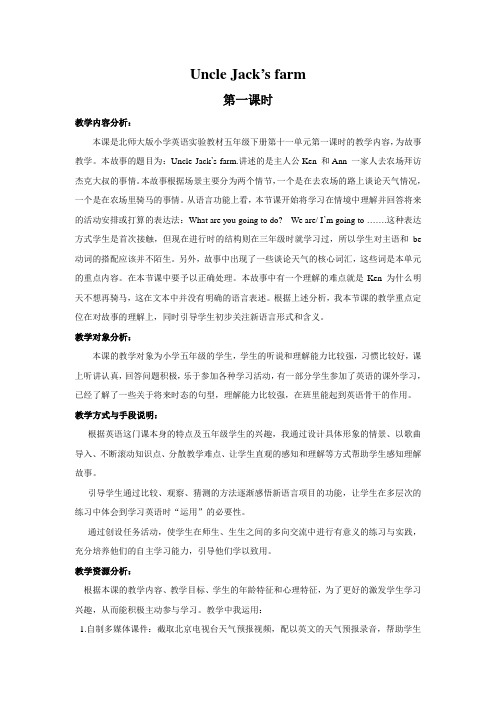
Uncle Jack’s farm第一课时教学内容分析:本课是北师大版小学英语实验教材五年级下册第十一单元第一课时的教学内容,为故事教学。
本故事的题目为:Uncle Jack’s farm.讲述的是主人公Ken 和Ann 一家人去农场拜访杰克大叔的事情。
本故事根据场景主要分为两个情节,一个是在去农场的路上谈论天气情况,一个是在农场里骑马的事情。
从语言功能上看,本节课开始将学习在情境中理解并回答将来的活动安排或打算的表达法:What are you going to do? We are/ I’m going to …….这种表达方式学生是首次接触,但现在进行时的结构则在三年级时就学习过,所以学生对主语和be 动词的搭配应该并不陌生。
另外,故事中出现了一些谈论天气的核心词汇,这些词是本单元的重点内容。
在本节课中要予以正确处理。
本故事中有一个理解的难点就是Ken 为什么明天不想再骑马,这在文本中并没有明确的语言表述。
根据上述分析,我本节课的教学重点定位在对故事的理解上,同时引导学生初步关注新语言形式和含义。
教学对象分析:本课的教学对象为小学五年级的学生,学生的听说和理解能力比较强,习惯比较好,课上听讲认真,回答问题积极,乐于参加各种学习活动,有一部分学生参加了英语的课外学习,已经了解了一些关于将来时态的句型,理解能力比较强,在班里能起到英语骨干的作用。
教学方式与手段说明:根据英语这门课本身的特点及五年级学生的兴趣,我通过设计具体形象的情景、以歌曲导入、不断滚动知识点、分散教学难点、让学生直观的感知和理解等方式帮助学生感知理解故事。
引导学生通过比较、观察、猜测的方法逐渐感悟新语言项目的功能,让学生在多层次的练习中体会到学习英语时“运用”的必要性。
通过创设任务活动,使学生在师生、生生之间的多向交流中进行有意义的练习与实践,充分培养他们的自主学习能力,引导他们学以致用。
教学资源分析:根据本课的教学内容、教学目标、学生的年龄特征和心理特征,为了更好的激发学生学习兴趣,从而能积极主动参与学习。
苏州工业园区外国语学校初中英语九年级全册Unit 11经典练习题(答案解析)
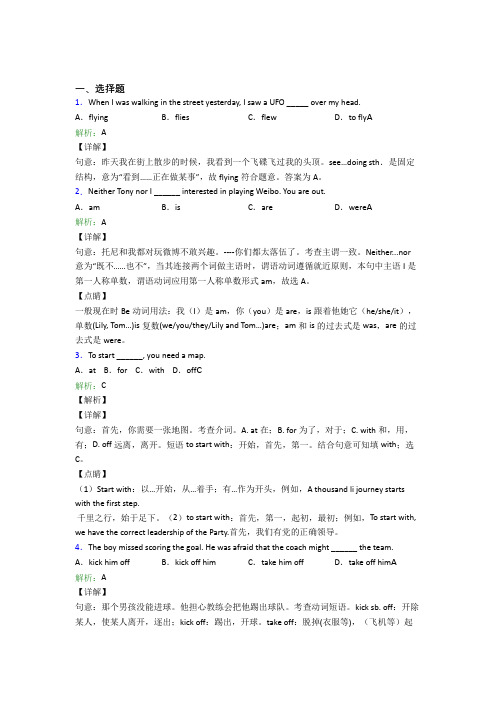
一、选择题1.When I was walking in the street yesterday, I saw a UFO _____ over my head.A.flying B.flies C.flew D.to fly A解析:A【详解】句意:昨天我在街上散步的时候,我看到一个飞碟飞过我的头顶。
see…doing sth.是固定结构,意为“看到……正在做某事”,故flying符合题意。
答案为A。
2.Neither Tony nor I ______ interested in playing Weibo. You are out.A.am B.is C.are D.were A解析:A【详解】句意:托尼和我都对玩微博不敢兴趣。
----你们都太落伍了。
考查主谓一致。
Neither...nor 意为“既不……也不”,当其连接两个词做主语时,谓语动词遵循就近原则,本句中主语I是第一人称单数,谓语动词应用第一人称单数形式am,故选A。
【点睛】一般现在时Be动词用法:我(I)是am,你(you)是are,is跟着他她它(he/she/it),单数(Lily, Tom…)is复数(w e/you/they/Lily and Tom…)are;am和is的过去式是was,are的过去式是were。
3.To start ______, you need a map.A.at B.for C.with D.off C解析:C【解析】【详解】句意:首先,你需要一张地图。
考查介词。
A. at在;B. for为了,对于;C. with和,用,有;D. off远离,离开。
短语to start with:开始,首先,第一。
结合句意可知填with;选C。
【点睛】(1)Start with:以…开始,从…着手;有…作为开头,例如,A thousand li journey starts with the first step.千里之行,始于足下。
职高英语基础模块下册unit11
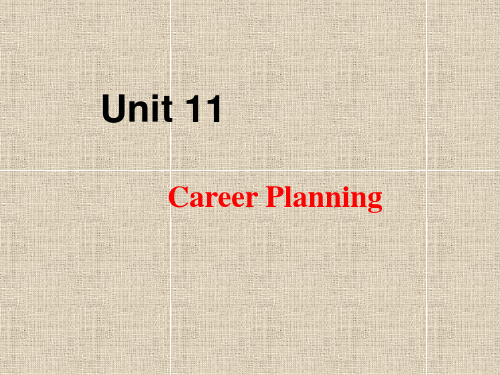
In a separate section you can make a list of honors and activities, such as awards you have received and school activities you participated in. 在一个独立的部分,你可以列出有关你的获奖 情况和参加活动的情况,诸如你获得的奖励和 在学校参加的活动。
起来越多的人关心环境问题了。
动词ing形式作主语
Finding a suit同ab位le语j。ob补充is说v明er前y面 important for us students, but it is not easy to find a good one at present in the world which is full of competition and challenges.
He is leaving for Beijing in two days.
他两天后要去北京。
表示交通方式、行程安排、约会的动词,例如 fly,walk, ride, drive, take(a bus, a taxi)等的现在进行时也经常用于表示将来。 这时动词可以不是转移动词。 When are you starting?
对于我们学生来说,找一份合适的工作非常重 要。但是在目前充满了竞争和挑战的世界上, 找一份好工作很不容易。
but it is not easy to find a good one at present in the world which is full of competition and challenges.
山东潍坊二中初中英语七年级下册Unit 11经典测试(培优练)
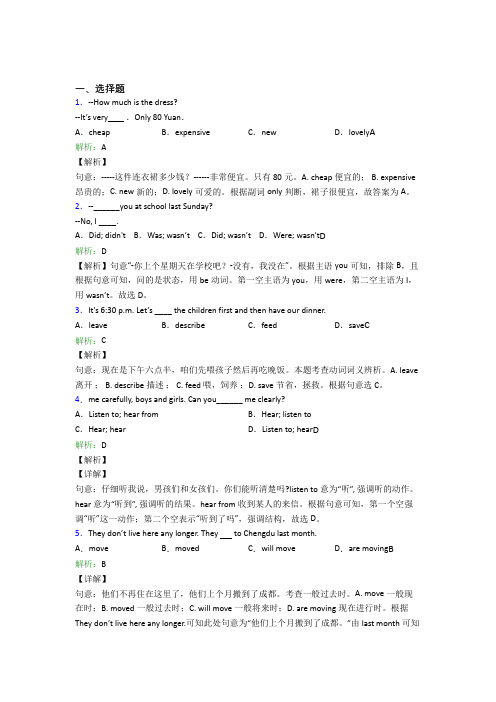
一、选择题1.--How much is the dress?--It’s very.Only 80 Yuan.A.cheap B.expensive C.new D.lovely A解析:A【解析】句意:-----这件连衣裙多少钱?------非常便宜。
只有80元。
A. cheap便宜的; B. expensive 昂贵的;C. new新的;D. lovely可爱的。
根据副词only判断,裙子很便宜,故答案为A。
2.--______you at school last Sunday?--No, I ____.A.Did; didn't B.Was; wasn’t C.Did; wasn’t D.Were; wasn't D解析:D【解析】句意“-你上个星期天在学校吧?-没有,我没在”。
根据主语you可知,排除B,且根据句意可知,问的是状态,用be动词。
第一空主语为you,用were,第二空主语为I,用wasn’t。
故选D。
3.It’s 6:30 p.m. Let’s ____ the children first and then have ou r dinner.A.leave B.describe C.feed D.save C解析:C【解析】句意:现在是下午六点半,咱们先喂孩子然后再吃晚饭。
本题考查动词词义辨析。
A. leave 离开; B. describe 描述; C. feed 喂,饲养;D. save节省,拯救。
根据句意选C。
4.me carefully, boys and girls. Can you______ me clearly?A.Listen to; hear from B.Hear; listen toC.Hear; hear D.Listen to; hear D解析:D【解析】【详解】句意:仔细听我说,男孩们和女孩们。
你们能听清楚吗listen to意为“听”, 强调听的动作。
山东省济南第一中学初中英语九年级全册Unit 11经典题(答案解析)
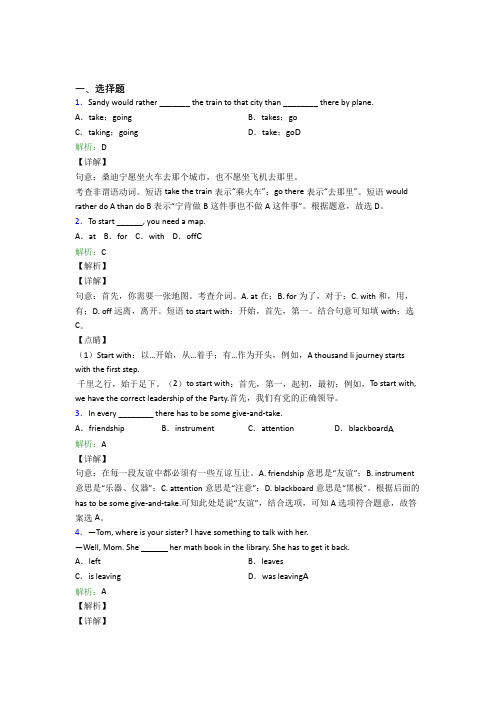
一、选择题1.Sandy would rather _______ the train to that city than ________ there by plane. A.take;going B.takes;goC.taking;going D.take;go D解析:D【详解】句意:桑迪宁愿坐火车去那个城市,也不愿坐飞机去那里。
考查非谓语动词。
短语take the train表示“乘火车”;go there表示“去那里”。
短语would rather do A than do B表示“宁肯做B这件事也不做A这件事”。
根据题意,故选D。
2.To start ______, you need a map.A.at B.for C.with D.off C解析:C【解析】【详解】句意:首先,你需要一张地图。
考查介词。
A. at在;B. for为了,对于;C. with和,用,有;D. off远离,离开。
短语to start with:开始,首先,第一。
结合句意可知填with;选C。
【点睛】(1)Start with:以…开始,从…着手;有…作为开头,例如,A thousand li journey starts with the first step.千里之行,始于足下。
(2)to start with:首先,第一,起初,最初;例如,To start with, we have the correct leadership of the Party.首先,我们有党的正确领导。
3.In every ________ there has to be some give-and-take.A.friendship B.instrument C.attention D.blackboard A解析:A【详解】句意:在每一段友谊中都必须有一些互谅互让。
A. friendship意思是“友谊”;B. instrument 意思是“乐器、仪器”;C. attention意思是“注意”;D. blackboard意思是“黑板”。
- 1、下载文档前请自行甄别文档内容的完整性,平台不提供额外的编辑、内容补充、找答案等附加服务。
- 2、"仅部分预览"的文档,不可在线预览部分如存在完整性等问题,可反馈申请退款(可完整预览的文档不适用该条件!)。
- 3、如文档侵犯您的权益,请联系客服反馈,我们会尽快为您处理(人工客服工作时间:9:00-18:30)。
1.关于时间如何询问:在英语中询问时间一般情况下我们用when或者what time. 问时刻的时候一般用what time比如:What time is it now? What time do you go to school? 当然了针对不同情况也有不同的问时间的方法。
常见的就有how long, how often, how soon这几种。
How long用来问多久: How long have you lived in Zhengzhou ?How often用来问频率:How often do you go to the zoo? Once a week.How soon 用来问多久以后:How soon will you come back?In a week. 注意一般情况下用how soon 提问时都是在将来时态里面使用的,回答时候也一般用in加上一段时间.2.频率副词的使用在前边我们已经讨论过用在be动词后面动词前面这里再次给出几个例子:He is usually wearing an old hat.I usually go to school by bus, but sometimes I go to school on foot.Does she usually get up at 6:30 in the morning?3.现在进行时:现在进行时是英语中一个重要的失态,因为非常好用。
首先他可以用来描述正在发生的事情。
凡是要表达某种事情正在发生的事情时都可以用这个时态。
这个时态需要用到am is are其中一个加上Ving来完成所以进行时里面最麻烦的就是ving相见下面表格其中双写最后字母的最为麻烦,但是其实很简单除了begin, forget这两个单词以外其他的单词基本上只要不超过五个字母的单词都需要双写最后一个字母,这也是个窍门以后可以利用。
除此以外进行时还可以表示将来这在以后的学习中会见到大家自然会遇到这里不再多说。
但是一个很好用的方法是用进行时态进行抱怨或者是赞扬,只需要在进行时态中加入often 或者是always这样的频率副词就好了:He is always talking big!语法练习用单词正确形式填空1.Look! The children_______(play) football on the play ground. They_______ (play) footballon every Sunday.2.Please be quiet! We ________(listen) to the song you and me.3.It’s a fine day, and the sun_________(shine).4.Tom and Jim ________(do) their home work at the moment.5.John’s father ________(run) 10 miles to keep fit every day.6.Han Mei _________(like) watching TV. She _________(watch) TV every evening. But nowshe_________(not watch) TV, she ________(get) ready for he test.7.It’s six O’ clock and my father _______(work) in the office.8.Listen, someone_________(read) in the classroom.9.The little girl _________(look) like her father, but now she_________(look) at her photo.10.I ________(like) drawing very much, look! I _________(draw) a big tree.词汇A.写出下列各词的现在分词形式(-ing)。
see ______ play ______ read ______ like ______get ______ sing ______ open ______ clean_____write______ listen______ lie_________ put_______B . 考考你。
你能总结出上面各词转化成现在分词的规律吗?a. ______________________ ,例如:play---playingb. ______________________ ,例如:write---writingc. ___________________________________________,例如:get---gettingC. 宝剑出鞘。
你能根据你自己总结出来的规律,将下面的单词放入下面的三个圈中swim begin sit dance come set puttake speak ask run make go watch仿照举例写对话Model:Where/Jim/singHe/in the classroomWhere is Jim singing?He is singing in the classroom.1. Where / postman / goHe / to our friends’ house________________________________________________________________________2. Where / women /sitThey / in the park________________________________________________________________________3. Where / Anna / read her bookShe / in the living room________________________________________________________________________4. Where / men / workThey / work/ behind the house________________________________________________________________________单项选择从A、B、C、D四个选项中,选出可以填入空白处的最佳选项。
( ) 1. Maria is ______ TV now .A. watchingB. lookingC. seeingD. reading( ) 2. The students are ______ their homework.A. WritingB. doingC. cleaningD. playing with( ) 3. It’s six o’clock in the afternoon .Mr. and Mrs. Green are ______ dinner in the kitchen.A. eatingB. doingC. havvingD. waiting( ) 4. My grandfather often ______ newspapers in the afternoon.A. watchesB. seesC. readsD. looks at( ) 5. They are ______ English.A. readingB. watchingC. sayingD. looking( )6.Tom ______ his bed every morning.A.make B.makingC.makes D.makeing( )7.My mother ______ cooking for us.A.am B.isC.be D.are( )8.______ your brother playing chess with Jack?A.Are B.IsC.Does D.Is( )9.—What is Mary doing?—She's ______ something.A.look at B.look likeC.looking for D.looking( )10.The women are ________ in the park.A.make photos B.taking photosC.making photo D.takeing photo从下列四种排列中选择正确的排列顺序( )1.①opening ②the boy ③the door ④is.A.①②④③B.②①④③C.②④①③D.④②③①( )2.①the blackboard ②are ③looking at ④the students ?A.②①③④B.②④③①C.①②③④D.④②③①( )3.①Tom and Bill ②playing ③are ④in the tree house.A.①③②④B.④③①②C.③①②④D.③④②①( )4.①over there ②are the children ③what ④doing?A.①②③④B.②①④③C.②④①③D.③②④①( )5.①could ②come here ③you ④please?A.③①②④B.④③①②C .①③②④D .③②④①你能给下面这段对话排序吗?试一试 ( ) 1. She is in the garden .( ) 2. She is reading under the tree. ( ) 3. Is Eli in the garden, too? ( ) 4. He is playing football. ( ) 5. Where’s Wendy? ( ) 6. Yes, he is.( ) 7. What’s she doing?( ) 8. It’s in the garden .It’s running after a cat. ( ) 9. What’s he doing? ( ) 10. What about the dog?ABD( )2. — Open the door please, Lucy . Lily, is she opening the door?—Yes, she is.( )3. Jim is writing. Lily isn't writing. She's looking at the blackboard. ( )4. — Don't close the window, Jim. Is he closing the window, Lily? — No, he isn't从方框中找出下面各句的答语,将编号填入刮号 ( )1. What are those men doing?( )2. Where is that plane going ? ( )3. What are the girls doing?( )4. Where are the children? And what are they doing? ( )5. What are the dogs doing ?( )6. Who is walking over the bridge with his family? ( )7. Who are washing the dishes?( )8. Are the children doing their homework?完形填空Mr. Smith 1 from London. Now he is in China. He is 2 .He teaches 3 a middle school. He works very hard. His students like 4 very much. He can 5 a little Chinese . His students often teaches him Chinese 6 Sundays. Mr. Smith likes playing football . He often plays football 7 his students.Mr. Smith 8 a son. His name is Jack. He is student. He studies in a middle school. He goes to school 9 bike everyday. He gets back home at four in the afternoon. He likes 10 TV in the evening.( )1.A. come B. comes C. are D. coming( )2.A. a teacher B. a worker C. a driver D. a farmer( )3.A. on B. in C. to D. from( )4.A. he B. him C. she D. her( )5.A. say B. speak C. talk D. tell( )6.A. at B. on C. of D. in( )7.A. for B. to C. with D. at( )8.A. has B. have C. there is D. there are( )9.A. on B. by C. in D. of( )10.A. seeing B. looking C. watching D. looking at阅读理解AMany people like to watch TV. Watching TV is one of the most important activities(活动) of the day. TV brings the outside closer to people’s homes. Some people say the world is smaller than before because of TV.What’s going on in the other countries? How do people live in places far away? Is there a good sports game somewhere? What’s life in the deepest part of the sea?If you want to answer these and other kinds of questions, just turn on the TV. Turn it on and watch. You can see a lot and learn a lot. Of course, people can also learn through reading or listening to the radio. But with TV they can learn better and more easily. Why? Because they can hear and watch, too.TV helps to open our eyes, and TV also helps to open our minds. TV often gives us new ideas. We learn newer and better ways of doing something.( )1. Some people say the world is smaller then before because _____. makes the earth smaller and smallerB.all people like to watch TV brings the outside world closer to peopleD.watching TV is one of the most important activities of the day( )2. We can _____when we watch TV.A.go to live in places far awayB. answer TV many questionsC.get a lot of informationD. ask TV some questions( )3. People learn better through TV than through radio because _____. sets are expensive than radioB.they can only hear with the radioC.it’s easier to turn on TV than to turn on radioD.people know nothing about the world through radio( )4. The sentence “TV helps to open our eyes” means _____.A.When we watch TV, we have to open our eyesB.We will not close our eyes when we watch TVC.Watching TV is good for our eyes can help us to see something about other places( )5. This passage has told us _____.A. it's good to watch TVB. not to watch TV any moreC. students should watch TV all the timeD. not to listen to the radioBDick was a clever and hard-working student, but his parents were poor, so he had to work after class and during his holidays to get enough money for his studies.One summer he got a job in a butcher’s (肉店) during the daytime, and another in a hospital at night. In the shop, he learned to cut and sell meat. He did so well that the butcher often left him to do all the things while the butcher went into a room behind the shop to do the accounts(做帐). In the hospital, of course, Kick was told to do only the easiest jobs. He helped to lift people and carry them from one part of the hospital to another. Both in the butcher’s shop and in the hospital, Kick had to wear white clothes.One evening in the hospital, Dick had to help to carry a woman from her bed to the operating room. The woman already felt frightened(害怕) when she thought about the operation. When she saw Kick coming to get her, she felt even more frightened.“No! No!” she cried, “Not my butcher! I won’t let my butcher operate on me!” With these words, she fainted away(晕倒).( )1. Dick had to work after class and during his holidays because ______.A. he liked to be a butcherB. he wanted to be a doctorC. his family was poorD. he wanted to be rich( )2. Dick did so well in the butcher’s shop, so the butcher ______.A. let him do the accountsB. let him cut and sell meat aloneC. let him get a job in a hospitalD. let him wear a butcher’s clothes( )3. Dick wore white clothes ______.A. only at homeB. all the timeC. both in the butcher’s and in the hospitalD. only in the hospital( )4. In the hospital, the woman thought Dick would ______.A. operate on herB. sell meat to herC. cut her into piecesD. sell her like meat( )5. Which is the right order of the following statements(陈述)?a.Dick got a job in the butcher’s shop.b.The woman would not let Dick operate on her.c.Dick got a job in the hospital.d.The woman bought some meat from Dick.e.The woman fainted away.A. a;e;d;c;bB. e;d;b;c;aC. a;c;d;b;eD. a;c;d;e;bCLong, long ago, people thought that the sun went around the earth. In some countries, people even said that the sun was a god(神). They thought that he drove across the sky each day on a golden(金色的) horse.But now we know the earth goes around the sun. Today men even know how far it is for the earth to go around the sun. they tell us that the earth travels over 1000 miles(英里) a minute on its way around the sun.The sun is really a star. It is much bigger than the earth and it is very hot. Some people have been to the moon, but we know that no one can ever get to the sun. It is too hot for people to live anywhere near it. The sun is 300,000 times(倍) heavier than the earth and more than a million tines larger.( )1. In some countries, people _____the sun to be a god, riding a golden horse.A. tookB. sawC. thoughtD. looked( )2. _____for the earth to move around the sun once.A. The time is a monthB. It is a yearC. It is a dayD. The time is a century ( )3. Which is the biggest? ______is .A. A man-made satelliteB. The earthC. The moonD. The sun( )4. Why can’t people live in the sun? Because _______.A. there is much waterB. it is too hotC. it is too far awayD. the sun is heavier than the earth( )5. Which of the following is not true?A.Someone will get to the sun in a spaceship.B.People once thought that the sun went around the earth.C.The sun is a star in the space.D.The earth is much smaller than the sun.DBill and Tom were walking in the forest one day, and stopped to pick up some nuts under a tree. They heard a strange noise coming from a hole in the tree. Bill climbed up to look in. Two baby squirrels(松鼠) were inside, crying for their mother. Someone killed her and left the babies to die. Each of the boys put a baby squirrel in his jacket pocket and carried it home. There the boys made a soft bed in a box for the little animals, and fed(喂养) them warm milk from a small bottle. The squirrels soon grew round and fat. Bill and Tom liked them very much.( )1. One day Bill and Tom were walking ______.A. in the streetB. in the forestC. in the parkD. on the farm ( )2. Bill and Tom found the baby squirrels ______.A. at homeB. on the groundC. in a hole in the treeD. under the tree ( )3. What did the boys do to the squirrels?A.They left the babies to die.B. They carried them home.B.They put them back in the tree. D. They threw them away.( )4. The boys fed the squirrels ______.A. waterB. breadC. nutsD. warm milk( )5. The squirrels soon ______.A. were illB. ran awayC. diedD. grew round and fat作文_______________________________________________________________________________ _______________________________________________________________________________ _______________________________________________________________________________ _______________________________________________________________________________。
